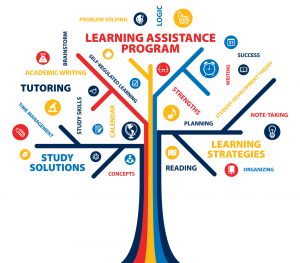The 2020 Summer Semester is breaking new ground at UVic and everywhere as the first semester fully online. While some students revel in the flexibility that comes with pre-recorded lectures, others may find the transition impacting how they study. How can students ensure a productive semester at home by creating and maintaining accountability in their academic work?
SET GOALS
We believe success is best defined by each student, but commonly we hear students define success as “knowing I put in my best effort and receiving a grade I feel proud of”. We all know there are many smaller milestones to get to that final result. In our experience it’s important to set yourself smaller, more tangible goals throughout the semester to help you succeed. This is actually supported by research as well!
Go week by week, and day by day. If there’s a major assignment due on Friday, set yourself an early deadline to have a draft done by Monday. If you have a midterm on Thursday, put aside one to two hours per day in the days preceding. (The best way to study is to review the material multiple times over a longer time frame – more on ‘spaced retrieval practice’ in a future post!). Your goal for one study session could be to recall (from memory) the key concepts from one chapter and explain them in your own words. Breaking large tasks down is critical to success – this helps us avoid becoming overwhelmed with goals that are too big or abstract. See more of our resources for goal-setting here.
CREATE STRUCTURE
Pre-recorded lectures can make it easier to put-off classes. Wherever possible, dedicate specific times to “attend” your lectures the same way as you would with in-person classes. Understandably this won’t always be possible for students juggling multiple commitments across school, work, family, and social lives. Creating routine for yourself has many advantages including majorly reducing anxiety and overwhelm. This will look different for everyone, but a good place to start is setting aside certain hours of the day for studying, watching lectures, or connecting virtually with profs over office hours. This ensures you’re giving yourself the time and head-space needed to succeed in your studies.
MANAGE YOUR TIME
Somehow, even if you’re stuck inside during a pandemic, time can fly when it comes to deadlines. Time management is by far the most requested area students ask us for help with. The LAP has a page dedicated to time management. Some key tips that may prove especially useful for online learning are:
- Get the big picture. Go over your course syllabi and write down when all your assignments are due. From there…
- Work backwards to create smaller sub-goals and project milestones. Prioritize, prioritize, prioritize. What assignments are worth the most? Which projects are due the soonest? What are all the phases of this group project/term paper/presentation and what inputs are required in each phase? Start early and block off weekly times to work on major assignments so you’re not stuck doing it all the night-before.
- Figure out when you’re most productive. Morning bird or night-owl, one advantage of working from home is that you have more control over which hours of the day you dedicate to school. And while working specific hours each day helps to maintain structure, you also have flexibility to do your work when you’re at peak focus.
- Schedule breaks and leisure time. Building some well-deserved rest and recreation periods into your day is important for physical and mental health. These times are just as important as school and work obligations, so don’t hesitate to block them off and switch your brain out from scholar mode.
GET COMFORTABLE
Pajamas? Sweat pants? No pants? Why not! Get as comfortable as you can in your own home so you can focus. Many people find that getting dressed for school and having a dedicated study space helps them transition into the right mindset for concentrating on schoolwork. Others couldn’t care less. Whatever your situation, try to find a place where you feel comfortable—but also focused. Maybe your bed isn’t the best spot to watch a lecture if you’re already half-asleep.
Do your best to set up your space before you start studying by gathering all your materials, water/snacks, putting your phone in the other room, whatever you need to sustain focus. One popular technique for short focused sessions is the tomato timer or Pomodoro technique. This is basically about short focused sessions – say doing 20 minutes on, 5 minute break, 20 on, 5 off, 20 on, 5 off and then taking a longer break to move around/snack.
HOLD TO ACCOUNT
Life happens. Things come up, and sometimes we can’t follow through with certain commitments. That’s okay. Good goal-setting involves many revisions to our deadlines and success criteria, because as we get deeper into a project new details, opportunities and constraints are illuminated. But when nobody else is expecting certain markers of you—no professor to take attendance, no classmates waiting for you in discussion group—it’s easy to let things slide and not make up for lost time. Make a point to reschedule missed hours when possible; you could even pair up with another student in the class for regular check-ins on each other’s progress. We call this your “AccountabiliBuddy” (we know, cheesy, but catchy!).
BE FORGIVING
Learning and working from home is not the same as learning on-campus. There will be challenges, and if you find yourself struggling to concentrate or at reduced levels of productivity, we hope you can treat yourself gently and extend some self-compassion. In our experience, being hard on yourself after a set-back doesn’t actually lead to better focus or performance. Remember to breathe, take time to check-in with yourself, and accept that this will take time and getting used to.




Hi, i think that i saw you visited my site thus i came to “return the favor”.I am attempting to find things to improve my website!I suppose its ok to use some of your ideas!!
This is a very helpful article. It’s never been easy to take online classes as I have never took any online classes until I had to because of COVID-19 and since then I have been looking for good ways to help myself with online learning. I will definitely use these advices to improve myself.
This is an excellent resourfe to share with students. I will be teaching first year students and I have been looking for ways to support their tranisiton from high school to Universtiy/College and online learning